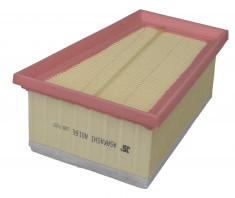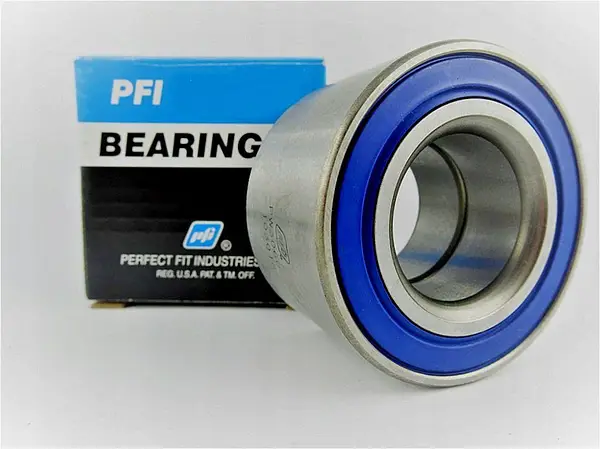-14%
PFI PFI Front Wheel Bearing Ford Fiesta, Focus, Figo
A wheel bearing is a crucial component of a vehicle’s wheel assembly that facilitates smooth and friction-free rotation of the wheel. It is typically located within the hub assembly or wheel hub, allowing the wheel to rotate freely while supporting the weight of the vehicle. Here’s a detailed definition:
Definition:
Wheel Bearing: A wheel bearing is a mechanical component installed within the wheel hub assembly of a vehicle. It consists of a set of steel balls or rollers enclosed within a metal ring (race) and a lubricating grease or fluid. Wheel bearings provide support and allow the wheel to rotate smoothly with minimal friction and wear.
Benefits:
- Smooth Wheel Rotation:
- Wheel bearings enable smooth rotation of the wheels by reducing friction between the wheel hub and the axle shaft. This allows the wheels to spin freely with minimal resistance, promoting efficient vehicle operation and optimized fuel efficiency.
- Enhanced Steering Response:
- Well-functioning wheel bearings contribute to responsive steering and handling characteristics. By facilitating smooth wheel rotation, wheel bearings help transmit steering inputs from the steering system to the wheels accurately and promptly. This improves steering response, maneuverability, and driver control, especially during cornering and evasive maneuvers.
- Reduced Rolling Resistance:
- Wheel bearings minimize rolling resistance by facilitating smooth wheel rotation. This reduces the amount of energy required to propel the vehicle forward, resulting in improved fuel economy and reduced emissions. Lower rolling resistance also contributes to a quieter and smoother ride quality for occupants.
- Improved Vehicle Stability:
- Properly functioning wheel bearings play a critical role in maintaining vehicle stability and control. By ensuring consistent and predictable wheel movement, wheel bearings help stabilize the vehicle during straight-line driving, cornering, and braking maneuvers. This enhances overall vehicle stability, reduces the risk of loss of control incidents, and promotes safer driving conditions.
- Optimized Braking Performance:
- Wheel bearings contribute to optimized braking performance by ensuring smooth and consistent wheel movement during braking. Properly functioning wheel bearings help maintain even brake pad contact with the brake rotors, promoting balanced braking forces across all wheels. This improves braking efficiency, reduces stopping distances, and enhances driver confidence in emergency braking situations.
- Long-lasting Component Life:
- High-quality wheel bearings are designed for durability and longevity, even under demanding driving conditions. By minimizing friction and wear between rotating components, wheel bearings help protect critical suspension and drivetrain components from premature wear and damage. This extends the lifespan of wheel hubs, axles, CV joints, and other related parts, reducing maintenance costs and enhancing vehicle reliability.
- Quieter Operation:
- Well-maintained wheel bearings contribute to a quieter and more comfortable driving experience. By reducing friction and vibration, wheel bearings help minimize noise, humming, and vibration transmitted from the wheels to the vehicle chassis. This results in a quieter cabin environment, reduced driver fatigue, and enhanced passenger comfort on long journeys.
- Enhanced Safety:
- Wheel bearings play a crucial role in vehicle safety by ensuring reliable wheel movement and stability. By preventing wheel wobble, vibration, or play, wheel bearings help minimize the risk of wheel detachment or loss of control incidents. Properly functioning wheel bearings are essential for maintaining safe driving conditions and reducing the likelihood of accidents or breakdowns.
Signs of a worn out Wheel Bearing;
- Strange Noises:
- One of the most common signs of a worn-out wheel bearing is a humming, growling, or grinding noise coming from the vicinity of the affected wheel. This noise typically increases with vehicle speed and may change in intensity when turning. The sound may be more noticeable when driving on a smooth road surface and may disappear when the vehicle’s weight shifts off the wheel bearing, such as during a turn in the opposite direction.
- Wheel Vibration or Wobble:
- A worn-out wheel bearing can cause vibrations or wobbling sensations felt through the steering wheel or vehicle chassis, particularly at higher speeds. This vibration may become more pronounced as the bearing deteriorates further and can affect the vehicle’s stability and handling.
- Uneven Tire Wear:
- A worn-out wheel bearing can lead to uneven tire wear, especially on the tire adjacent to the affected wheel. As the bearing wears, it may allow the wheel to tilt slightly, resulting in irregular tire wear patterns such as scalloping or cupping on the tire tread.
- Loose or Wobbly Wheel:
- A severely worn or damaged wheel bearing can cause the affected wheel to feel loose or wobbly when lifted off the ground or when rocking the wheel back and forth by hand. This indicates excessive play in the bearing assembly and requires immediate attention to prevent further damage or safety hazards.
- ABS Brake System Warning Light:
- In vehicles equipped with an anti-lock braking system (ABS), a malfunctioning wheel bearing can trigger the ABS warning light on the dashboard. This occurs when the ABS sensor mounted near the wheel bearing detects irregular wheel speed or movement caused by a failing bearing.
- Heat Buildup:
- A worn-out wheel bearing may generate excessive heat due to increased friction and resistance within the bearing assembly. This heat buildup can cause the bearing to expand and may lead to premature failure, resulting in further damage to the surrounding components.
- Difficulty Steering or Maneuvering:
- A worn-out wheel bearing can affect the vehicle’s steering response and maneuverability, making it more difficult to steer or control the vehicle, especially at higher speeds or during cornering. This can compromise driving safety and requires immediate attention to prevent accidents or loss of control.
- Visible Damage or Play:
- In some cases, a visual inspection of the wheel bearing assembly may reveal signs of damage, such as rust, corrosion, or visible play in the bearing components. Any visible damage or looseness in the bearing assembly indicates a need for replacement to ensure safe and reliable operation.
Follow us on Facebook for more parts.



